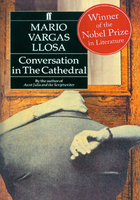"It all started," the man told Jemma, "with the voice from my fireplace." They were climbing the stairs, on their way to the roof, to look out on the state of creation. It was one day since the hospital had been cast adrift, and she was trying very hard not to consider things. It had become immediately apparent to her that the disaster—if that was a great enough word for it, if there was a great enough word for it—had spawned two types of people: those who considered things, and those who did not. There were only a few of the latter; she and this man seemed to be two of them. When she tried to think of the dead she only saw her own four, their faces flashing in succession, or the four of them standing quietly in a bright room, or the four of them adrift on the new great ocean, hand in hand in hand in hand, arms and legs spread so they made a wide rosette, spinning just under the surface of the water with their eyes open and bubbles caught beneath their chins.
When she'd finally made it back to the call room, after listening over and over, always disbelievingly, to the hidden lady—where the hell was she? everyone kept asking—who told them over and over that they had been preserved from a world-wide deluge, after she'd given up trying to peer through the windows, after she'd had a clutching reunion with Vivian, and after she'd tired of the organizing chaos all over the hospital, she'd found Rob there, laid out crookedly on his belly in the little bed, weeping into his arms. Jemma stretched herself over him, reaching past his head to take his hands. "Something awful has happened," he told her again. "It's not a trick or a drill. It's something more horrible than anything that's ever even happened before."
"I know," she said, because she had suffered enough disasters to know a real one from a fake one. But she could think of no words that might comfort him. It would have been enough, she thought, to weep with him, but she could not even do that. She felt very little except pain at his pain. What if it were true, that the world, as the grating voice insisted, was drowned and the only survivors were those who were trapped within the round walls of this hospital. She thought something in her should balk at believing it, but nothing did. She was so used to getting horrible news, she never doubted anything bad: your brother is dead; your father has died; your mother was in that burning house; Martin has had an accident; of course, of course, of course, of course. Only good news ever seemed unreal to her, anymore, and the fact of all those ended lives—a comical voice numbered them in her head, billy-uns and billy-uns and billy-uns—only put in her a familiar stony feeling, that left her calm and alert, so she thought as she listened to Rob's titanic weeping that she could discern the four distinct sobbing tones. She could name the muscles that shifted her to and fro as she rode on his back. She could track the progress of his tears down his face despite the dim light, and mark the tiny increments by which the tear stain grew on the festive sheet. She knew this state of being, her funeral mode—now time would slow down and stop and she would feel, would know, that this was the essence and purpose of her whole life, to be somebody leftover, when all the good people, the neat people, the cool people, the people who were actually people and not crawly depressive lizards, were dead, and to feel nothing about it, except the same old stony feeling and the not gnawing but nibbling suspicion that she had missed out, again. She put her face in his neck and said them again, empty words: "I know."
"I thought it was the devil talking, at first," the man told her. "Who else would speak out of the ashes? It was a cold night, but I had no fire going, so the voice came out of the blackness. It said, Listen to me, creature. I am an angel of the Lord. He has decreed a work for you."
Jemma had not asked him to explain anything; he had just started talking as soon as they'd met. He was coming up the stairs to the first floor just as she was entering the stairwell. They stood and regarded each other for a moment. She saw a haggard-looking man in a green suit and terribly ugly shoes, little slippers of woven leather afflicted with beaded tassels on either front.
"Is it… flooded down there?" she had asked him, looking over the railing at the stairs going down; she counted ten flights before they disappeared into darkness. She had taken the stairs to the nursery a hundred times; there hadn't used to be a basement.
"Certainly not," he said. He stared at her, not creepily. There was not much creepy about him, for all that he looked like a hospital administrator or a mortician. His stare was merely frank and curious, open and honest.
"I'm going up to the roof," she told him, when he kept staring at her. It was all over the hospital, announced by rumor and by the voice of the telephone lady who claimed to be an angel, that the roof was off limits, that the stairs were locked and the windows blacked for a very important reason—that what lay outside was so awful that to look at it would cost a person her sanity. "It is not yet time," the lady said. "It is forbidden." But Jemma had sneaked away from the new, expanded duties with which Rob kept himself busy to go and look. She had searched on three different floors for an open door to the stairwell, bumping shoulders with people going about frantic hospital business on the big ramp that ran in a spiral up the center of the hospital and led to every floor, and was the only way to get from one ward to another while the elevators were off-line. She walked around the lobby, stopping before the place where the main doors had been, pausing under the big toy, a giant perpetual-motion machine built to amuse visitors. She tried to appear innocent, looking up into the wires and beams and struts and gears and parachutes, watching the bowling balls leap from basket to basket, the water running in the sluices and the iron sailboats racing in the high courses—the thing had changed with the rest of the hospital, getting twice as complex as it had been before, and twice as stupid, and now it gave Jemma twice as bad a headache to stare at it, but she feigned interest until she was sure no one was looking before she darted to the doors. Every door in the lobby was locked, but she found a way into the stairwell in the now empty ER, suddenly the quietest place in the hospital since every child there had been admitted upstairs. There was no one there to hear her kicking the door and rattling the handle. "There you go," said the mechanical lady, when the handle finally turned. "I thought it was forbidden," Jemma said, looking around for the source of the voice—sometimes she spoke out of speakers but sometimes the voice just came out of a blank wall. "Hello?" Jemma said, but the lady didn't answer.
"That's where the stairs go," said the man. "Up."
"I want to see what it looks like."
"I can tell you what it looks like," he said. "It looks like a lot of water."
"I want to see."
He shrugged.
"How do you know, anyway? I thought nobody was allowed to look."
"I haven't," he said. "I don't need to. I just know, like I know the windows will go transparent again in about fifteen minutes. You may as well stay down here and wait. It's a lot of stairs."
"If you know so much, tell me why the elevators don't work." She tried to look skeptical, but knew she probably just looked confused.
"Oh, they will. In about an hour." He looked at his watch and counted past hours on his fingers, his lips moving silently. "Sorry, hour and a half. More or less."
"Right," she said, not convinced. "Who the hell are you, anyway, that you know all this shit?"
"I'm the person who built this place. Well, maybe not built it. But I designed it." He struck a pose, throwing his hands up to the right of his face and splaying his fingers, as if to say, See? Jemma recognized the gesture, and suddenly thought she recognized the man.
"Do I know you? I think I know you."
"I've never seen you before in my life," he said.
But she did know him, because she subscribed to a silly architecture magazine, and had spent idle moments, when she ought to have been studying, gazing at all the marvelous residences, imagining herself sprawled out in every one of the over-appointed rooms, without a care in the world. It was only three or four issues since she had seen this man and his buildings, and remembered especially a giant seaside house he'd built for an eccentric cat-food magnate. Who could forget the many vast rooms—the long hall containing a little forest of rare-wood scratching posts, the thousand square-foot cat-condominium, the long troughs of litter in the chambre de toilette, scented, the captions said, with cardamom and myrrh—all of it as empty of cats as the other fantastic houses always were of people? Jemma hated cats, and remembered the house partly because it seemed so egregious and stupid, and because she remembered the picture of this man, standing outside the cat-palace, striking that very same pose that said, See what I did?
"What's your name?"
"John Grampus," he said, starting up the stairs. Jemma followed him.
"I'm Jemma."
"Who cares? You could be anybody. It doesn't matter, as long as you have ears to listen. I used to be forbidden to tell about it. I used to get my ass kicked every time I tried."
"Forbidden?"
"Uh huh. But not anymore. I thought I was going crazy, of course. There are… were… a lot of crazies in my family. Everyone was crazy—two of my sisters, my uncle and my aunt and creepy Cousin Alex, my grandfather, my great grandfather, my great-great grandfather—there's a fine tradition of suicide there. And my mother—she lost her mind one day in the supermarket. She heard the bread talking. It kept saying, Save me, Oh please save me from this life, and Mama always said it had a voice like an angel, so you can imagine how I worried when that voice came from beneath the ashes.
"She told me that seven miles of water were coming to drown all flesh, and that I had been chosen to build what would be the vessel of salvation for a chosen few. Even after I started to believe it, I wanted nothing to do with the idea, let alone the… commission. What sort of fucking lunatic would want to deal with that kind of shit? Not me. I was never even a very religious person, not in the way you think. I was a treeist, really, you know? I met every Saturday with a group of people who had found very spiritual connections with trees. Some people could go all over the place, any old species would do, but I only felt it with an aspen. I'd put my hands on it and rest my head against the bark and then it always happened. Wham! A great peace.
"I did not want the world to end, and I wanted no part of any plan that would bury all the nice people of the earth, not to mention every last aspen, under seven miles of water. Not everybody's a moron, after all, or a cruel motherfucker, though there are a lot of those out there, and I've dated enough of them. But you can't blame me for hesitating, can you?"
"No," Jemma said. She was thinking, we are floating on top of seven miles of new ocean. She tried to imagine the bodies of all the lost, already buoyant with decay. Surely they would cover the water from horizon to horizon. She squeezed her eyes shut and tried to see them, but still she only saw her four. With great clarity she could see her mother's long hair slowly lashing the faces of the others.
"But you do not say no to an angel. No, you do not. Mind you, it took a while for me to even take the situation seriously, to believe it was real. For many days I pretended like I didn't hear a thing, though every night she came and spoke from the fireplace. And when I tried to flee the fireplace, she would speak out of the blackness of sewer grates, or from within black cups of coffee. When I finally decided I wasn't crazy, after all—when I decided it was actually happening—I said I couldn't do it, that I wouldn't do it. That made her angry. I shouldn't have made her angry."
They passed the third floor. Jemma stumbled but John bore her up. She opened her eyes again, and considered the feeling that was in her, and decided that when she saw all the bodies floating, an enormous grief would be written on that blank feeling. It said something terrible about a person, that they had to pretend to grieve at the end of the world. Good Rob Dickens wept not just for his mother and his sisters, but for all the dead, every single creature. When Jemma held him she pressed her face close to his to steal his tears, so when he blinked at her so sadly he would think she was crying, too.
"Can I tell you what happened next? Maybe it's rude. Maybe that part is still a secret." He looked up the stairwell, then glared at the cinderblocks in the wall. "Do you care?" he asked, almost shouting, and it took a moment for Jemma to realize he wasn't talking to her. There was no answer. "I doubt it," he continued. "I doubt she cares. Well, I was in my living room when I defied her. She was speaking from the fireplace, and when I said no, go get yourself another sucker—actually I said, Go get yourself another sucker, bitch—she said, Stupid creature! in this voice that was so different from before, full of doom but somehow kind of… attractive. She rushed out of the fireplace and ravished me. I don't know how else to put it. It was sexual. Oh no! Oh yes! I didn't want it to happen. I don't even like women, not in that way, be they angel or mortal. I don't like to look at them. I don't like to touch them. I don't like them at all. And why, oh why would I be interested in one of those when all my life I suspected that they were gateways to endless, horrible darkness. Wet, sucking, fishy darkness in an empty cave. I had a dream once where I was attacked by a flying horde of them—they were like bats, flapping all around me, and they bit me with tiny little needle teeth and all I could think was, Now I need a rabies shot. But I did it like I'd been waiting for it all my life. It was sort of sexual and then totally sexual—she was this roiling blackness, with no fishy smell at all. I kept waiting for that. She was so black it hurt my eyes to look at her—I felt this weird pressure, like the darkness was pulling on my eyes, pulling and releasing them and pulling and releasing them, and it hurt. She pulled at me all over, and released me, and pulled. Is this getting gross?"
Jemma nodded.
"Well, when she took me I saw the futility of resistance. The new flood would happen, with or without me. There were others who could do what I could do, though not as well. I thought, I had better do it, since I was damned if I didn't, and maybe—is this too vain?—if I did it things would be better for the people who were going to live. I'm not a nobody, after all. Anybody else's hospital would not be mine, and probably not as good. Would anybody else think to do the sur-basins in teak? Would anybody else put in a star chamber? Would anybody else have a fake perpetual-motion machine that turns into a real perpetual-motion machine? Maybe it was a sign, how I could already see in my mind how the rooms would unfold out of each other. When she was done with me, I wanted to do it for her, anyway. Because though she had hurt me I found myself suddenly but undeniably in love with her. Does that make sense?"
"Not really," said Jemma softly.
"Well, I didn't think it would. I can hardly expect you to understand. Maybe somebody else will. There are a lot of people in this hospital. Almost as many as I hoped for."
"Seven miles?" she said. They were passing the fourth floor, but she was not out of breath because they were proceeding so slowly, each of them pausing before each step as if actively considering if it was truly wise to go on.
"Seven miles. That was the plan."
"That's impossible," she said.
"Nothing is impossible for Him." He raised a finger next to his face to point straight up. "That's what she said. He made this earth. Why shouldn't He be able to drown it?"
"Not again," Jemma said. "He said he wouldn't." Never again. Never ever. It was a fact remembered from her third-grade religion class. Sister Gertrude had related to her and her classmates the horrors of the flood, insisting they imagine the agony of the sinners as they drowned. Drowning was one of the worst ways to die, she had said, because you know it's coming, but you can do nothing to stop it. She had made them all hold their breath for as long as they could. "Don't you dare breathe!" she had shrieked at Jemma, when a little whistling sigh escaped from between her lips. "The waters are pressing down on you!" And after she had brought a few of them to tears at the absolute hideousness of it all, and filled them with a nauseating fear of God, she had thrown wide the classroom curtains and pointed at the rainbow with which she had synchronized her lecture. "Never again, children!" she cried, with genuine joy on her face. "Never again!" While the class giggled or wept with relief Jemma had vomited a morning snack of chocolate milk down her jumper.
"Yes," he said. "Those were my words exactly. I even got a Bible and pointed it out to her. She didn't argue. She didn't even respond. But I learned pretty soon that nothing would be like it was before. I do not know why. Because she called me a prophet, I thought I would be forced to rush out like a madman and warn of the coming flood, but in fact I was forbidden to do so. Of course, I tried right away to tell everybody I could. I knew better already than to talk back to her, at this point, but I was thinking, Fuck you, lady, I'll tell anybody I want! I tried to tell my dad, on the telephone, not caring if he thought I was crazy. I only wanted him to be safe, never mind how he made me take piano for fourteen years and made me do that stupid fucking pinewood derby thing every year, though I always lost, and always cried, and he called me pussy-face every time, and not just over the derby. Did I skin my knee? Pussy-face! No date for the prom? Pussy-face! Not distinguished enough for Yale? Pussy-face! What sort of father calls his kid that? It didn't matter. All was forgiven, everybody was going to die. But when I tried to tell him, I couldn't even form the words. I was physically unable to speak. She knew I had tried and she punished me, but when she was done she became very tender and… sticky. And she said to me, You may only tell the children.
"Because the whole thing was for the kids, right?" he said, and paused. They had passed the fifth floor, and were halfway to the sixth. Jemma noticed that the numbers that marked the floors were different from before—they were bigger and the colors were deeper. They shined at the surface like they were still wet, or like the surface of puddles. She put her hand against the 5 as they passed it, expecting her hand to sink into the bright yellow paint. It was solid and smooth, and made her hand tingle. "That was my job," he said, "to design a hospital for sick kids. But not just a hospital—it would be a wonderful new machine for which the angel would become the soul and the mind, the intellect and the will. Not that I had ever designed a hospital before. Or a computer, for that matter—that's where she lives, in the last basement. Way, way, way down, in the computer core. When I said I couldn't do it, she asked me, Where is your faith, creature? Where is your trust in the Lord your God? Lost up my ass, bitch, I said, but she knew that I was the bitch, and I would do anything she told me to, and believe whatever she told me, and try my hardest for her because she was becoming the most important person in my life. Sure enough, within a month the hospital people called me right out of the blue to offer me the commission, and when I sat down to do it, it just sort of happened. It was all inspiration. And even though I didn't understand where it came from, I understood it when it passed through my hand. Fantastic shit, crazy shit—I can hardly describe it, but you'll see it working. When the construction began I visited the site every night with her, hidden in her darkness, and she executed miracle after miracle, building all the secret holy parts of the building while I directed her from a second, secret set of plans, that only she and I ever saw. For once she did as I told her, and I swear she didn't understand how most of what she was building actually worked, but I did. I got it." He tapped a finger against his head. "It all just sort of rose up. I got proud. She punished me."
He ran his hand along the wall as they passed the doorway to the seventh floor. "Oh, the whole place is a miracle," he said. "I could bore you with all the miracles. Dry as a bone, even in the deepest cellars. Replicators—have you seen those yet?—that can make anything out of anything. You were wondering, weren't you, how we're supposed to eat? Wait until you see! Apples out of old shoes; shoes out of shit; movies out of just an idea. Wait till you try that. It's like humming a few bars and then getting the whole song played back to you, but you tell her a couple lines of a story and she gives you back the whole thing, just as you would have imagined it, if only you weren't too depressed, or too dull. Every day there was some new incredible thing to conceive and build. I started thinking of the people who would come—I could almost see you all, and understand how horrible it was going to be, but it was up to me to make it a little bit better. I am to be the preserver and the comforter, she told me—a load of shit. It was me. I was doing it all. She was just the fucking wrench. Night after night after night of miracles. I didn't want to ever finish because I knew what would come after we were done.
"All this miraculous shit," he said, throwing out his arms in a gesture meant to take in the whole hospital, "all to save the kids. I don't have any kids, but if I did, you can bet they would be here. No nieces or nephews, either. I would have brought them, too. As it was, I warned as many children as I could. You have to believe me. They were the only ones I could tell. I would go to playgrounds and lean over the fence to talk to a child, and I could speak. I'd say what was coming, and sometimes they would listen, and sometimes they were old enough to understand what I was saying, but none of them took me seriously. The small ones thought I was telling a story, the bigger ones told me I was crazy. And a grown man cannot go talking to children in a playground without arousing suspicions. There are those signs, right? No adults allowed without the company of a child. But I couldn't stop until I had gotten at least one to say he would go to the hospital if an unusually heavy and persistent rain should begin to fall. Children complained to their parents about the strange man in the park. There was a trip to the police station. One boy did say he would go, when the time came. That was something." They had passed the eighth and ninth floors, the signs sea green and sky blue.
"I thought it would come sooner, you know. This hospital has been operating for what—a year? I had all that time to fret. I thought maybe it wouldn't happen, though she never left me, and she always said it would indeed happen, that it would be swift and ferocious, not like last time where it just sort of drizzled a warning for days and days while everybody went on burning their children and fucking their poodles. And it was pretty ferocious, wasn't it? Well, here we are."
They stood at the bottom of the last flight of stairs, looking up at the door to the roof. "Still want your look?" he asked.
"Yes," she said. Seven miles, she was thinking. Hah! But even inside her head the exclamation sounded weak and full of doubt. John Grampus went up the stairs and threw the door open. It was dark on the other side, and Jemma wondered if it was night already until she realized that the door did not lead directly outside. He threw a switch on the wall beyond the door and lit up an enormous room. The walls and roof were made of glass, but they were darkened like all the windows below. The place was full of plants and flowers, some that Jemma recognized—fig trees and ferns and roses and mums and daisies and irises in lacquered pots—and some that she didn't, strange tall flowers that looked vaguely like orchids, and short plants with succulent leaves as long as her finger. They shivered when she bent to touch one.
"We're in the greenhouse," he said, closing the door and punching a button on the wall. There were buttons all over the place, now. She had spent two weeks in this hospital, slave to the whims of cruel nurses, a fetch-monkey for attendings and residents—they'd sent her all over on unimportant missions of busywork, and she'd wandered, herself, bored and lonely, despite her exhaustion too nervous to sleep in between deliveries. She was familiar with the whole place, so all the new buttons and switches and consoles in the walls were shocking to her. Looking for an open door to the stairs, she had noticed that the halls were wider everywhere, the ceiling was higher, and the place was full of new corridors and doors and rooms—the whole hospital had expanded as if it had taken a huge, deep breath.
"Ready?" he asked. She did not respond, but he threw open the door anyway, and it so happened that they were standing just in front of the sun, and when the light hit her eyes she cried out and closed them.
"Easy now," he said. "I have sunglasses, but not for you. Didn't you think it might be sunny? Here, I'll guide you." He took her by the elbow and drew her out into air which felt crisp and bright against her skin. She didn't breathe at first because she feared the air would be full of the miasma of wet rot, but when she breathed the air was sweet. "I wonder why it isn't colder," he said, "since we're so high up. I wonder why we aren't choking, for that matter. Go ahead and open your eyes."
Jemma shut her eyes tighter, considering things. Maybe it was enough, just to have come up here. Maybe she should just turn around and hurry back down the stairs. She probably did not really want to see all the bodies, their agony still obvious on their faces, whatever cruel seabirds had survived nesting in their hair and lazily pecking at the ripe eyeballs of their hosts, and it would probably be better to hold on to that blank feeling, an old friend, after all. She should be a sensible person for once and realize that she did not want to see the water, seven miles deep over the whole unfortunate world. It would all remain impossible, after all, until she opened her eyes.
Years before, Vivian—back then still a new friend but the closest thing she had to family—had walked her up the aisle, past the rows of folding chairs draped with hideous velvet slipcovers, and the calla lilies flowering in an obscene corridor on either side of her feet. For the tenth time that day she thought how the calla lily must be the nastiest flower ever, and wished again that someone would outlaw it. Faces turned to watch her as she passed, people crying or whispering. She would not turn to look at them directly. A trick of her peripheral vision made the heads seem like they were waving on stalks or bobbing on strings. Jemma leaned heavily on her friend. Funeral number four, she thought. I should be good at this, by now.
Martin's mother was waiting with him, dressed in a black sequined dress that might have been matronly if not for the hip-high slit that revealed her aged but shapely leg. She leaned against the coffin like a crooning dame against a piano. As people paused to look in she would touch their hands or faces with her own hand. "Isn't he beautiful, Jemma?" she asked, when Jemma came near enough to see in. He was not beautiful anymore. The mortician had failed to restore the symmetry of his face ruined in the crash, and in trying to hide the bruising on his face had only succeeded in tarting him up horrifically. His staring eyes were the worst thing, stitched open so he could, as his mother requested, see into eternity. "Kiss him goodbye, darling," his mother said. "One last time, honey."
"Don't do it," Vivan whispered, but Jemma did. She bent closer and closer, seeking to reconcile this face with the living boy she had loved. He stared past her. Before she kissed his lips she saw how they were parted slightly, and how thick the thread was, twine really, that bound his mouth and kept his jaw from dropping down to his chest. A coldness went into her when she touched her lips to his, and the feeling, a great heaviness, centered in her belly, as if she had eaten a boulder.
"Kiss me, too, darling," said his mother, reaching for her and blinking through her tarry mascara. Before she could grab her Vivian stepped ahead and absorbed the awful embrace. Her lover's mother seemed not to notice. She wept ecstatically, and seemed not to hear when Vivian said, "There, there you horrible beast." Jemma stepped back and watched as the elfin mortician turned a little crank set at one end of the coffin, and the lid slowly closed. She looked back and forth between Martin's face and the mortician's ears. Twin eruptions of white hair poured out of them, like little clouds of steam that belied the fixed waxy friendliness of his expression. As the lid fell further down, and the crack grew smaller, she bent at the waist to peer in a final time, not knowing why she did, because it only made the heavy feeling heavier, every second longer she looked at the face. A final bit of light gleamed in his soulless eye. She thought she saw him wink, and then the coffin was closed.
"I shouldn't have looked," she said to Vivian.
"I fucking told you," she said gently, guiding her back to her seat. Jemma had closed her eyes and not opened them yet, and did not open them through the rest of the ceremony. While Father Dover spoke false praise about her lover—wasn't he patient, wasn't he peaceful, wasn't he a gentle boy?—she watched the dead face stare past her, and felt the heaviness in her get weightier, as if the stone she'd eaten was dividing in her, pounds into pounds, and she felt sure she'd never move again.
"Open your eyes," said John. Jemma had them shut so tight that the muscles at her temples were twitching and she was getting a headache.
"I don't want to see it," she said. She held out her hand at him. "I changed my mind. Take me back down."
"You'll see it anyway. Listen, it's starting now." Above the wind she could hear a faint whooshing noise that sounded precisely like a heart murmur. It grew louder and harsher as she listened. She was bad at murmurs, but found herself quite readily classifying this one—high pitched, rumbling, holosystolic—the hospital had aortic stenosis. The building moved under her feet, and she cried out as she fell, opening her eyes and throwing her hands behind her to break her fall.
"See?" he said. "It's far more horrible than it looks." Jemma shaded her eyes with one hand and looked out ahead. The roof had changed since the last time she'd sneaked up here. Previously a wide space of concrete with a few well-tended planters, now it was all grass and gardens—a huge tree was growing on the other side, reaching out of a crowd of bushes and benches and plants. Jemma was standing in the middle of a field of soft grass, surrounded by a little road that ran the circumference of the roof. Beyond the edge there was only blue water, no bodies or birds or bobbing detritus. The hospital was spinning—that was why she'd fallen.
"What's happening?" she asked.
"An adjustment," he said proudly. "The windows are clearing—I told you they would. Some hallways are lengthening while others contract, just a little. The carpets are growing thicker. The hospital is still preparing, becoming what we need it to be. It's nothing to be afraid of."
She rose unsteadily, climbing up the man's side—he seemed quite sure of his footing. They spun in a brisk arc. Jemma saw the same thing no matter how far the hospital turned her: a calm flat blue that stretched to a line where it changed its shade almost imperceptibly and became the sky. It should not have been beautiful, but she found it to be so. She imagined quite vividly the horrors masked by that insouciant blue surface, and tried so hard to feel a crushing grief, but only the heavy feeling came, filling her up and rooting her to the spot, so she stood firm even as the hospital stopped its rotation and turned the other way, then stopped again and began to move forward, as if it had suddenly become certain of its direction. It gathered speed, so Jemma's hair flew back above her head and her eyes and nose burned from the cold wind. She looked away from the water and sky to study John's face. He'd lifted his glasses to look toward the horizon. She thought her face must look like his, blank but not calm. "It's so blue," he said.
"Where are we going?" she asked him anxiously, finally registering the very determined way the hospital was moving through the water.
"You know as well as I do," he said, and shrugged. "She never told me what would happen next."















